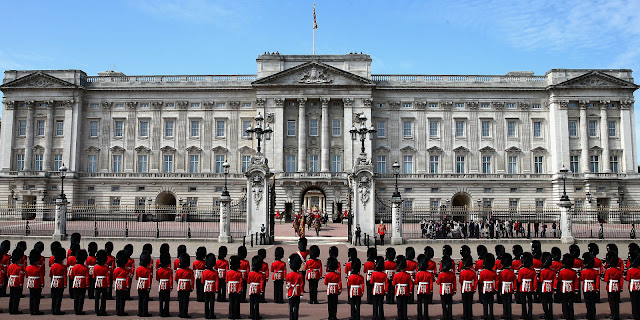The Duke and Duchess of Cambridge are delighted to be able to share two new photographs of Princess Charlotte. They were taken by The Duchess in early November at their home in Norfolk.
29.11.15
28.11.15
27.11.15
26.11.15
25.11.15
Does what we wear define who we are?
“Does what we wear define who we are?
Help us stop discrimination and make a real difference to peoples lives.”
Help us stop discrimination and make a real difference to peoples lives.”
24.11.15
23.11.15
22.11.15
21.11.15
20.11.15
19.11.15
18.11.15
Comma story - video
It isn't easy holding complex sentences together (just ask a conjunction or a subordinate), but the clever little comma can help lighten the load. But how to tell when help is really needed?
17.11.15
16.11.15
15.11.15
Making sense of spelling - video
What can spelling tell us about relationships between words? While spelling may sometimes seem random or unexpected, this lesson illuminates how peeling back the layers of spelling helps us understand the complex history and meaningful structure of words.
14.11.15
13.11.15
Where did English come from? - video
When we talk about ‘English’, we often think of it as a single language. But what do the dialects spoken in dozens of countries around the world have in common with each other, or with the writings of Chaucer?
12.11.15
How to use a semicolon - video
It may seem like the semicolon is struggling with an identity crisis. It looks like a comma crossed with a period. Maybe that’s why we toss these punctuation marks around like grammatical confetti; we’re confused about how to use them properly.
11.11.15
Your online life, permanent as a tattoo
All right, so let's take four subjects that obviously go together: big data, tattoos, immortality and the Greeks. Right?
00:21Now, the issue about tattoos is that, without a word, tattoos really do shout. [Beautiful] [Intriguing] So you don't have to say a lot. [Allegiance] [Very intimate] [Serious mistakes] (Laughter) And tattoos tell you a lot of stories. If I can ask an indiscreet question, how many of you have tattoos? A few, but not most. What happens if Facebook, Google, Twitter, LinkedIn, cell phones, GPS, Foursquare, Yelp, Travel Advisor, all these things you deal with every day turn out to be electronic tattoos? And what if they provide as much information about who and what you are as any tattoo ever would?
01:21What's ended up happening over the past few decades is the kind of coverage that you had as a head of state or as a great celebrity is now being applied to you every day by all these people who are Tweeting, blogging, following you, watching your credit scores and what you do to yourself. And electronic tattoos also shout. And as you're thinking of the consequences of that, it's getting really hard to hide from this stuff, among other things, because it's not just the electronic tattoos, it's facial recognition that's getting really good. So you can take a picture with an iPhone and get all the names, although, again, sometimes it does make mistakes. (Laughter) But that means you can take a typical bar scene like this, take a picture, say, of this guy right here, get the name, and download all the records before you utter a word or speak to somebody, because everybody turns out to be absolutely plastered by electronic tattoos.
02:23And so there's companies like face.com that now have about 18 billion faces online. Here's what happened to this company. [Company sold to Facebook, June 18, 2012...] There are other companies that will place a camera like this — this has nothing to do with Facebook — they take your picture, they tie it to the social media, they figure out you really like to wear black dresses, so maybe the person in the store comes up and says, "Hey, we've got five black dresses that would just look great on you."
02:51So what if Andy was wrong? Here's Andy's theory. [In the future, everybody will be world famous for 15 minutes.] What if we flip this? What if you're only going to be anonymous for 15 minutes? (Laughter) Well, then, because of electronic tattoos, maybe all of you and all of us are very close to immortality, because these tattoos will live far longer than our bodies will. And if that's true, then what we want to do is we want to go through four lessons from the Greeks and one lesson from a Latin American.
03:22Why the Greeks? Well, the Greeks thought about what happens when gods and humans and immortality mix for a long time.
03:31So lesson number one: Sisyphus. Remember? He did a horrible thing, condemned for all time to roll this rock up, it would roll back down, roll back up, roll back down. It's a little like your reputation. Once you get that electronic tattoo, you're going to be rolling up and down for a long time, so as you go through this stuff, just be careful what you post.
03:53Myth number two: Orpheus, wonderful guy, charming to be around, great partier, great singer, loses his beloved, charms his way into the underworld, only person to charm his way into the underworld, charms the gods of the underworld, they release his beauty on the condition he never look at her until they're out.So he's walking out and walking out and walking out and he just can't resist. He looks at her, loses her forever. With all this data out here, it might be a good idea not to look too far into the past of those you love.
04:29Lesson number three: Atalanta. Greatest runner. She would challenge anybody. If you won, she would marry you. If you lost, you died. How did Hippomenes beat her? Well, he had all these wonderful little golden apples, and she'd run ahead, and he'd roll a little golden apple. She'd run ahead, and he'd roll a little golden apple. She kept getting distracted. He eventually won the race. Just remember the purpose as all these little golden apples come and reach you and you want to post about them or tweet about them or send a late-night message.
05:04And then, of course, there's Narcissus. Nobody here would ever be accused or be familiar with Narcissus. (Laughter) But as you're thinking about Narcissus, just don't fall in love with your own reflection.
05:20Last lesson, from a Latin American: This is the great poet Jorge Luis Borges. When he was threatened by the thugs of the Argentine military junta, he came back and said, "Oh, come on, how else can you threaten, other than with death?" The interesting thing, the original thing, would be to threaten somebody with immortality. And that, of course, is what we are all now threatened with today because of electronic tattoos.
05:46Thank you.
10.11.15
12 things you must know about Buckingham Palace
1. THE ROYALS CLAIMED THE LAND LONG BEFORE THEY HAD PLANS TO LIVE ON IT.
Edward the Confessor owned the village that stood there before the Norman Conquest, and Henry VIII reclaimed it for the Crown in 1531. When James I was on the throne in the early 1600s, he planned to plant a mulberry garden to rear silkworms, but used the wrong variety and had to abandon his grand idea.
2. IT'S NAMED AFTER A POLITICIAN.
John Sheffield (of the Tory party) became the Duke of Buckingham in 1703, and he built Buckingham House as a place to stay during his visits to London. It was given the ultimate makeover and transformed into a palace in 1820 by architect John Nash — who was subsequently fired for going over budget!
3. THE HOUSE PASSED INTO ROYAL HANDS IN 1761.

George III paid $32,784 ($4.7 million now) to buy it for his wife Queen Charlotte, who gave birth to all but one of their 15 children there. However, Queen Victoria was the first monarch to name it as her official residence when she moved there after her coronation in 1837.
4. QUEEN VICTORIA WAS PLAGUED BY AN UNUSUALLY DETERMINED TRESPASSER WHEN SHE LIVED IN THE PALACE.
Known to the press as "the boy Jones," teenager Edward Jones was caught in the palace three times during Victoria's reign—but probably sneaked in more often than that. He stole food and pieces of her underwear, and claimed to have sat on the throne. The government eventually kidnapped him and sent him to Brazil. When he escaped and returned, they imprisoned him on a ship for six years, and then sent him to Australia. He worked there as a town crier before his death on Boxing Day in 1893.
5. THE PALACE IS NOT JUST HOME TO ROYALTY.
Over 800 members of staff live there, including a flagman, fendersmith, and clockmaker. The latter must keep busy, as the palace contains 350 clocks and watches! They're wound up every week by two horological conservators, who work full-time to keep them ticking along.
6. THE GRAND BALLROOM IS THE PALACE'S PRIDE.
It's the largest room, at 36.6m long, 18m wide, and 13.5m high. The first event held there was a celebration marking the end of the Crimean War in 1856. The palace is not all ballrooms and banquet halls, though: There's also a post office, police station, doctor's surgery, cinema, and pool.
7. PART OF IT WAS TEMPORARILY TRANSFORMED INTO AN OPERATING ROOM.
Months before his coronation in 1902, Edward VII contracted peritonitis, a dangerous stomach infection. A room overlooking the garden was quickly adapted for surgery, which was fortunately a success.
8. THE PALACE SUFFERED THROUGH THE BLITZ WITH THE REST OF LONDON.
During World War II, King George VI and Queen Elizabeth publicly refused to leave the palace, which made it an appealing target. The buildings and grounds suffered nine direct hits during the raids. The Queen Mother described one bomb as causing "a tremendous explosion" but cheerfully added that "everybody remained wonderfully calm."
9. THEY WORK HARD TO KEEP IT LIGHT.
The palace's 760 windows are cleaned every six weeks. That fabulous ballroom was the first room to have electricity installed in it, in 1883. Lighting was extended to the rest of the rooms over the next four years, and there are now more than 40,000 light bulbs—pass the stepladder!
10. IT WAS THE HQ FOR A GUIDE COMPANY (THE UK VERSION OF GIRL SCOUTS).
In 1937, Princess Elizabeth joined the 1st Buckingham Palace Guide Company, alongside other royal children and the daughters of the staff. But being heir to the throne didn't guarantee her a leading role—she was the second in charge of her patrol! Although they suspended activities when World War II broke out in 1939, the Company reformed at Windsor in 1942.
11. IT'S BUILT ON SECRET TUNNELS.
As if a palace isn't exciting enough, there are passageways running beneath the surface that connect the building to nearby streets. Unsurprisingly, the Queen Mother and King George VI couldn't resist exploring. On one excursion, they apparently met a very polite man from Newcastle, who was living down there.
12. IT'S EASY TO TELL IF THE QUEEN IS HOME.
Just look at the flag! The palace flies the Union Flag when the Queen is not in, and the Royal Standard when she is. You might also spot that latter one fluttering from Victoria Tower at the Palace of Westminster: This signifies the Queen is in Parliament.
9.11.15
English idioms and expressions with the word dream
dream (noun) – things such as thoughts, images, or emotions that you experience in your mind while you are sleeping
♦ Last night I had a strange dream about a parrot called Claude.
dream (noun) a dream is something good that you want to happen very much
I have a dream that my four little children will one day live in a nation where they will not be judged by the colour of their skin but by the content of their character. Martin Luther King 1963
dream (verb) to experience thoughts, images, or emotions in your mind while you are sleeping
♦ I keep dreaming about being lost in a maze of pumpkins.
dream (verb) to imagine something that you would like to happen or achieve.
♦ I dream of going to university.
♦ I dream of being a doctor.
♦ He had always dreamt of climbing Everest.
English idioms and expressions with the word ‘dream’.
A dream come true is something that happens that you have always wanted or hoped for.
♦ Becoming a teacher was a dream come true for me.
♦ Meeting the love of my life was a dream come true.
♦ When I won the lottery it was a dream come true for my family.
♦ We didn’t think we would ever have children. When our daughter was born it was a dream come true.
♦ I’ve got the job! It’s a dream come true. I can hardly believe it.
A dream (something) – something that’s perfect, the best you can possibly imagine
Used before a noun.
For example:
a dream job
a dream house
♦ Nursing is my dream job. I love it. I can’t imagine doing anything else.
♦ She’s planning her dream wedding.
♦ I’ve just bought my dream house.
♦ You three are my dream team.
wouldn’t dream of doing something – something you say to someone to tell them that you would definitely not consider it or think it
♦ Please don’t tell the boss I was an hour late to work this morning.
Don’t worry. I wouldn’t dream of it.
Sweet dreams – something affectionate you say to someone who is going to sleep, to wish them a peaceful night without bad dreams.
♦ I’m off to bed now.
OK, sweet dreams.
Dream on! or In your dreams! – we say these expressions to let the person we’re speaking with know that they’re hoping for something impossible.
♦ I’m going to get 100% in this English exam.
In your dreams!
♦ I’m going to ask Sophia out on a date. I think she’ll say yes this time.
Dream on!
go like a dream – if something goes like a dream it goes very well or without problems
♦ My exam went like a dream. I answered all the questions and finished ten minutes early.
♦ How did your interview go?
Like a dream.
♦ His new car goes like a dream.
dream up something (or dream something up) – phrasal verb
If you dream up something you think of a new idea or plan, especially an unusual or imaginitive one.
♦ He’s always dreaming up new inventions. None of them seem to work very well.
Subscribe to:
Posts (Atom)


.bmp)




















